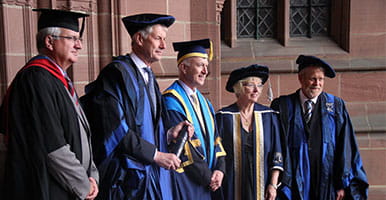Esther Rantzen CBE
Presented by Professor Frank Sanderson
Honorable Pro-Chancellor, I have pleasure in presenting Esther Rantzen for the award of an Honorary Fellowship from Liverpool John Moores University.
Journalist and television presenter Esther Rantzen is best known for writing and presenting That's Life! and for her numerous ground-breaking documentaries about social issues such as child abuse, drugs, mental health, and childbirth, several of which resulted in changes in laws and practice. And she has made a profound impact as founder of the charity ChildLine.
Esther Louise Rantzen was born in 1940 in Berkhamsted. When she was five, she went to Sarum Hall School in Hampstead which had, quote, 'a genuine child-hating sadist' as headmistress who liked to make the girls cry. This was followed by a much improved experience at North London Collegiate School in Edgware, and when she was 10, a 2-year period in New York with her family.
As a young girl, she was an avid reader of English novels and had an early ambition to be a school teacher. Her headmistress persuaded her to do something else first, and she ended up doing something else for the rest of her career. She read English at Somerville College, Oxford, and in 1963 went into BBC radio as a studio manager - and she stayed with the BBC for the next 39 years.
By 1968, Esther was an on-screen researcher on Braden's Week. In 1973, the BBC launched a new consumer programme, That's Life!, which was presented by Esther throughout its 21-year run, becoming the most successful programme of its kind in the history of television, reaching audiences of more than twenty million viewers.
The show had its quirky side, featuring Cyril Fletcher's Odd Odes, ping-pong playing kittens, and humorous misprints from newspapers sent in by viewers. But it also had its serious side in championing the consumer: with ground-breaking investigative journalism into dodgy businesses and petty bureaucracy. It also served as a springboard into serious campaigns.
In the mid-1980s, Esther received a letter from a young mother about her baby son needing a transplant. The story was featured on the programme and within a week there was a surge in the number of transplants around the country. Then Esther did a programme on child abuse, with an information helpline which became swamped with calls from children reporting physical and sexual abuse.
It was in this context that ChildLine was launched with 4,500 open lines in 1986. Esther sees this as her proudest achievement, which has been copied round the world. And we are proud to be associated with Childline Northwest. A number of our staff, students and graduates have become volunteer telephone counsellors, and we accredit the ChildLine Volunteer Counsellor training programme, providing some volunteers with their first experience of studying at university level. A number of ChildLine staff are Honorary Lecturers, helping us develop our courses and enhance our students listening and responding skills. And we have just established our first jointly funded PhD Scholarship with ChildLine and the NSPCC.
In 1977, Esther married BBC Executive and innovative documentary maker Desmond Wilcox and they were to have a "complete and all-consuming partnership" until Desmond's untimely 'gentle retreat' in 2000.
During her time with the BBC, Esther developed many pioneering programmes, including: The talent show The Big Time which launched the singing career of Sheena Easton. She briefly hosted a junior version of That's Life! in the 1980s. She devised a TV series called "Hearts of Gold" celebrating people who have performed unsung acts of outstanding kindness or courage.
During the 1990s, she presented a talk show, Esther, on BBC2.
Outside of her work, Esther has served on a number of Government committees including the Home Office Fear of Crime Committee, and has worked as patron and trustee to numerous other organisations, including the National Consumer Council and the NSPCC.
She has collected many honours over the years which, she says, "she prizes, doesn't deserve, but is certainly not going to hand back". They include: Two Bafta nominations for her talk show Esther, she was the first woman to receive the Dimbleby Award for Factual Presentation, The Variety Club of GB's BBC TV Personality of the Year, she was inducted into the Royal Television Society's Hall of Fame and she received the Snowdon Award for services to disabled people.
She has also received honorary doctorates from Southampton Institute, Portsmouth University and South Bank University.
She was awarded an OBE in 1991, and a CBE in the Queen's Birthday Honours in 2006 list in recognition for her work with Childline.
Recently honoured with a Lifetime Achievement Award by Women in Film and Television and, last but not least, She collected a Gotcha from Noel Edmunds.
Now retired from the BBC, Esther is not resting on her laurels. This extrovert who has always found stress energising lists her single recreation in Who's Who as GOD (i.e., Growing Old Disgracefully).
In recent years Esther has enriched her life through appearances on reality TV: she improved her French on "Excuse my French", she participated in the 2nd series of Strictly Come Dancing, which she has described as an absolutely awful experience, but looking on the bright side Esther, you did a lot better than Jimmy Tarbuck did in the 4th Series and you did slightly improve your fox-trot.
Esther also took part in the dating show Would Like To Meet in 2004, noting however that "No-one could ever replace Desmond," and this summer she is looking into her family history on the 5th series of Who do you think you are?
She has also concerned herself with a range of charities, has supported cancer research, and promoted an approach developed in Liverpool to better care for terminally ill patients.
It is just over a year since Esther visited Liverpool for our Roscoe Lecture Series, delivering a memorable lecture on "Protecting Vulnerable Children from Exploitation and Abuse".
We are delighted to welcome her back to pay tribute formally to her outstanding achievements in TV journalism and her extensive charity work, not least her founding of and long-term support for ChildLine, a charity which has made an enormous difference to children's lives.
Thus I have great pleasure in presenting Esther Rantzen, CBE, this most distinguished person, for admission to our highest honour of Fellow of Liverpool John Moores University.



